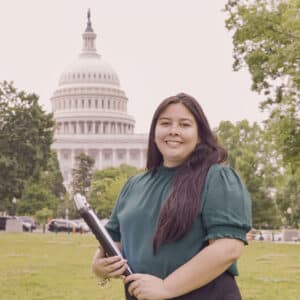October Policy News Round-Up
We celebrated LD Awareness month, helped introduce a resolution in Congress, and co-led a briefing on IDEA Full Funding. Learn more about what NCLD did this month.

Learning Disabilities Awareness Month
Every October, we celebrate Learning Disabilities Awareness Month! Our team has been working especially hard to bring visibility to our community across platforms and audiences. In the policy sphere, we hit some major milestones:
Representatives Julia Brownley (D-CA26) and Erin Houchin (R-IN09) and Senators John Hickenlooper (D-CO) and Ted Budd (R-NC) introduced a Resolution (S.Res.441, H.Res. 794) designating October as Learning Disabilities Awareness Month. Several bipartisan cosponsors joined them in recognizing the LD community on Capitol Hill. The resolution text also included highlights from NCLD’s recent release of reading and math data from the National Assessment of Educational Progress (NAEP) for students with a specific learning disability, codifying these in the Congressional record.
Additionally, the U.S. Department of Education’s Office of Special Education and Rehabilitative Services featured young adults’ blogs this month! Be sure to read Lead with LD: Honoring Yourself and Becoming an Effective Leader
by Kayla Helm-Queen and Making a Difference: Leading with LD as a Special Education Teacher by Erin Crosby.
School Climate Bills are Reintroduced
Progress has been made on two important school climate bills. The Safe Schools Improvement Act was introduced on October 24th by Rep. Linda Sanchez (D-CA38) and Rep. Mark Takano (D-CA39) in the House of Representatives and Sen. Bob Casey (D-PA) in the Senate. This bill focuses on eliminating bullying and harassment, requiring schools to adopt codes of conduct specifically prohibiting bullying and harassment on the basis of race, color, national origin, sex, disability, sexual orientation, gender identity, sex characteristics, and religion. It is one of five bills identified in a suite of school climate bills endorsed by the Leadership Conference on Civil and Human Rights (LCCHR)- a coalition NCLD participates in actively.
The Counseling Not Criminalization Act is expected to be reintroduced to Congress soon. This bill would end federal funding for school-based law enforcement and redirect those funds to counselors, teachers, and positive support for children in schools. Students with disabilities, as well as students of color, are disproportionately negatively impacted by the presence of school-based law enforcement. By redirecting funds, schools can foster more healthy and supportive environments. The Counseling Not Criminalization Act is also one of the five bills identified in the LCCHR suite of school climate legislation.
IDEA Full Funding Briefing
The IDEA Full Funding Coalition, co-chaired by Nicole Fuller, NCLD’s Policy Manager, hosted a briefing on Capitol Hill on October 18. The briefing delved into the history of funding for the Individuals with Disabilities Education Act (IDEA) and how federal funds for IDEA are used in schools, emphasizing the need for “full funding” at the federal level and supporting the IDEA Full Funding Act (S.2217/H.R. 4519). In addition to the presentation, the briefing featured a panel discussion with families and practitioners and remarks from Sen. Chris Van Hollen (D-MD), the lead cosponsor of the IDEA Full Funding Act in the Senate. Slides from the briefing can be found here.
Technical Assistance Center on Significant Disproportionality
The U.S. Department of Education authorized a new technical assistance center to address significant disproportionalities in special education. The TA Center, operating through data policy firm Westat, will help states improve data collection, reporting, and analysis related to racial/ethnic disparities in the identification, placement, and discipline of students in special education. Earlier this year, NCLD provided comments through the Federal Register, providing input on the objectives of this center.
Despite Opposition, 21st Century Dyslexia Act Reintroduced
On October 25, the 21st Century Dyslexia Act was reintroduced in Congress by Rep. Erin Houchin (R-IN09) in the House and Sen. Bill Cassidy (R-LA) in the Senate. NCLD opposes this bill due primarily to concerns with the way the bill defines dyslexia and separates dyslexia from other specific learning disabilities into its own disability category under IDEA. The bill relies on an outdated “discrepancy model” for dyslexia and also removes important exclusionary factors that must be considered when identifying students with dyslexia to protect them from being misidentified due to “environmental, cultural, or economic disadvantage.” NCLD and other disability rights partners sent a letter to legislators detailing these concerns earlier this year, which can be found here.
In Case You Missed It
- In late September, Congress averted a government shutdown and passed a 45-day Continuing Resolution (CR) to continue to fund the government through November 17th. Between now and then, Congress must either pass a funding bill for Fiscal Year 2025, another CR or face a government shutdown.
- Visit the NCLD Action Center to participate in our current advocacy campaigns, and contact your representatives!
